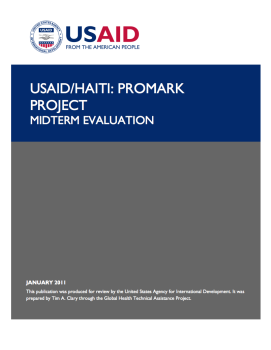The PROMARK Project, a contract funded by the U.S. Agency for International Development (USAID) in Haiti and implemented by Population Services International (PSI), the prime contractor, started in 2009. Its primary goal is to improve the health of the Haitian people by using social marketing to advance healthy behaviors through behavior change communication (BCC), health product promotion, and sales strategies. Though the project works nationwide, it focuses on rural and remote areas and underserved populations. Branded and generic messages are used to promote healthy behaviors toward human immunodeficiency virus/acquired immune deficiency syndrome (HIV/AIDS), family planning (FP), and child survival (CS). In conjunction with the branded messages, PROMARK offers six products through social marketing. They include male condoms, female condoms, oral contraceptives (OCs), injectable Depo-Provera, a water treatment product, and oral rehydration salts (ORS).
PSI has two partners (or subcontractors), Foundation pour la Santé Reproductrice et l’Éducation Familiale (FOSREF) and Christian Aid/Zerosida (CA/POZ). PSI is the leading organization for the socially marketed products and promotional activities, and FOSREF and CA/POZ focus on sensitizing the Haitian population through mass and interpersonal communication (IPC).
Even though there were some early problems in implementing PROMARK, nothing could have prepared the project, or any other stakeholder, for the events of 2010. On January 12, a 7.0 magnitude earthquake struck Haiti, killing more than 200,000 people and leaving more than 1.5 million homeless. In October 2010, a cholera epidemic quickly spread to all ten departments, killing more than 3,000 people. Political unrest, centered on the December 2010 presidential election, also hampered aid efforts. These events, combined with the already-low ranking of Haiti in the human development index, continue to challenge all partners.
Thus the midterm evaluation of PROMARK had to be accomplished in a difficult context. Rather than examining and evaluating PROMARK’s activities and results solely on intended targets, the evaluation team decided to look at systemic issues to produce a more useful review, assessment, and recommendations.


